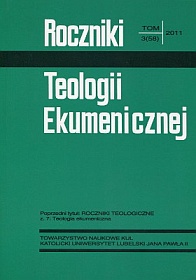Synergism between Divine Grace and Human Freedom: Is the Orthodox Idea of Man’s Deification Really Pelagian?
Abstract
According to the Holy Bible, God gives us unceasingly his grace in order to liberate humanity from sin and death. One of the most fundamental Christistian beliefs – which expresses the absolute primacy of God’s salvific will – says that God’s grace is necessary for salvation. The doctrine of divine grace was the main topic of the theological discussion between St. Augustine and Pelagius. The Augustinian doctrine presented clear opposition between the omnipotence of God’s grace and the weakness of the sinner. Augustine’s teachings prevailed in the Catholic doctine, although without its extremities. Meanwhile in the East, the Pelagian controversy was not understood and the Augustine’s doctrine of divine grace was not accepted. The Eastern theology speaks of synergism as a divine-human salvific cooperation. Is this not a Pelagian denial of the absolute salvific primacy of God?
To answer this question, the article seeks the notion of divine grace in the doctrine of the Orthodox Church. The concept of God’s grace is in this doctrine associated with the concept of deification (theosis). Essentially, God’s grace is the same as God’s uncreated energies. It is some kind of active presence of the Holy Trinity in the world. Its manifestations are the sacraments of the Church. Its aim is the final fulfillment of human destiny and of the world. Man’s free will is also an important gift of grace. God’s salvific action toward mankind leads to theosis which is the purpose of human life. It is achievable only through a synergy (cooperation) between human will and God’s uncreated energies.
The omnipotence of God’s grace does not destroy human freedom, because freedom of the human will itself is a God’s gift. The Orthodox doctrine of synergism, however, does not distinguish clearly God’s grace and human freedom. Man’s salvation is possible through the cooperation of grace and freedom, although ultimately divine Providence leads mankind to eternal fulfillment.
There are still some important doctrinal differences between Catholic and Orthodox theologies. The Eastern thought emphasises the deification of man and the ultimate goal of the human life. The Catholic doctrine is more practical: it seeks the way of salvation for a sinner.
However, it does not mean that these two concepts are totally incompatible. They both are based on the main Christian idea of God’s love toward mankind. The most important expression of this redemptive and salvific love is Christ’s Cross and Resurrection.
References
Afanasjew Mikołaj: Kościół Ducha Świętego. Białystok 2002.
Барсов Н.И.: Православие. W: С.С. Аверинцев (red.). Христианство. Энциклопедический словарь. T. 2. Москва 1995 s. 379-382.
Evdokimov Paul: Prawosławie, Warszawa 20033.
Góźdź Krzysztof: Teologia człowieka. Z najnowszej antropologii niemieckiej. Lublin 2006.
Greshake Gisbert: Wprowadzenie do nauki o łasce. Kraków 2005.
Guardini Romano: Wolność, łaska, los. Rozważanie o sensie istnienia. W: tenże. Koniec czasów nowożytnych. Świat i osoba. Wolność, łaska, los. Kraków 1969 s. 221-435.
Исихасты. W: С.С. Аверинцев (red.): Христианство. Энциклопедический словарь. T. 1. Москва 1993 s. 652.
Kraus Georg: Nauka o łasce – zbawienie jako łaska. Kraków 1999.
Лепорский П.И.: Благодать. W: С.С. Аверинцев (red.). Христианство. Энциклопедический словарь. T. 3. Москва 1995 s. 332-337.
Łosski Włodzimierz N.: Teologia mistyczna Kościoła wschodniego. Kraków 2007.
Mantzaridis Georgios I.: Przebóstwienie człowieka. Nauka świętego Grzegorza Palamasa w świetle tradycji prawosławnej. Lublin 1997.
Мейендорф Иоанн: Новая жизнь во Христе. Спасение в православном богословии. W: tenże. Рим, Константинополь, Москва. Исторические и богословские исследования, Москва 2006 s. 207-233.
Meyendorff John: Teologia bizantyjska. Historia i doktryna. Kraków 20072.
Palamas Gregorio: All’illustrissimo e graditissimo a Dio arcivescovo di Cizico Atanasio, che aveva chiesto, sugli scritti di Acindino, se coincidono con quelli di Barlaam intorno alla luce divina ed alla grazia divina, primo discorso. W: tenże. Che cos’è l’ortodossia. Capitoli, scritti ascetici, lettere, omelie. Milano 2006 s. 785-863.
Palamas Gregorio: Omelia XXXV. Sulla stessa Trasfigurazione del Signore in cui si fa vedere che la divinissima luce in essa manifestatasi, pur essendo increata, non è essenza di Dio. W: tenże. Che cos’è l’ortodossia. Capitoli, scritti ascetici, lettere, omelie. Milano 2006 s. 1347-1356.
Полупелагианство, w: С. С. Аверинцев (red.). Христианство. Энциклопедический словарь. T. 2. Москва 1995 s. 363.
Попович Иустин: Догматика Православной Церкви. Пневматология. Москва 2007.
Попович Иустин: Догматика Православной Церкви. Экклесиология. Москва 2005.
Синергизм. W: С.С. Аверинцев (red.). Христианство. Энциклопедический словарь. T. 2. Москва 1995 s. 573.
Соловьев В.С.: Пелагий. W: С.С. Аверинцев (red.). Христианство. Энциклопедический словарь. T. 2. Москва 1995 s. 328-330.
Špidlík Tomáš: Duchowość chrześcijańskiego Wschodu. Przewodnik systematyczny. Kraków 2005.
Spiteris Yannis: Ostatni Ojcowie Kościoła – Kabasilas, Palamas. Warszawa 2006.

